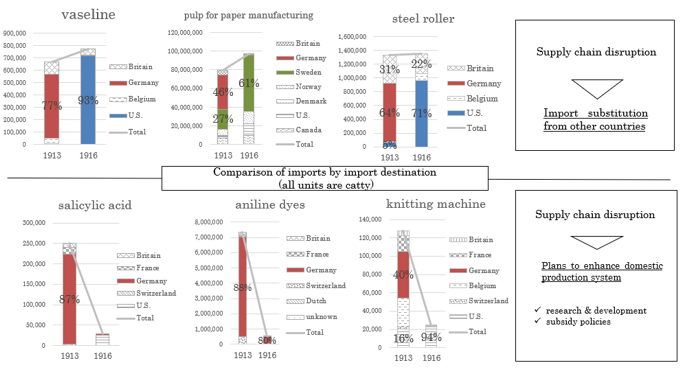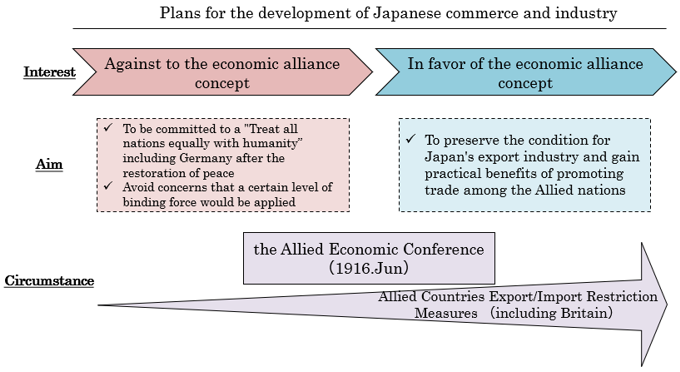| Author Name | SAKAMOTO Masazumi (Consulting Fellow, RIETI) |
|---|---|
| Download / Links |
This Non Technical Summary does not constitute part of the above-captioned Discussion Paper but has been prepared for the purpose of providing a bold outline of the paper, based on findings from the analysis for the paper and focusing primarily on their implications for policy. For details of the analysis, read the captioned Discussion Paper. Views expressed in this Non Technical Summary are solely those of the individual author(s), and do not necessarily represent the views of the Research Institute of Economy, Trade and Industry (RIETI).
Introduction: Japan's diplomacy and economy in an emergency (the First World War) about 100 years ago
Japan, which was not obligated to participate in the First World War (even in light of the Anglo-Japanese Alliance), had a certain free hand in foreign policy at the time. In other words, various Japanese diplomatic events (e.g., the decision to enter the war, the "Russo-Japanese Alliance", accession to the London Declaration in which the Allied nations promised not to make a separate peace, termination of "negotiations" with Germany for such a separate peace, "economic alliances" among the countries of the willing in an attempt to decouple from "enemy nations" including even after the war) were implemented at the discretion of the Japanese government itself. Under these circumstances, Japanese domestic public opinion, including that of the business community, may have exerted a certain influence on these decisions.
For the Japanese business community, the First World War brought about a period of economic growth in which businesses in various industries, including both heavy and chemical industries, profited and the size of government finances more than doubled. At the same time, the economy faced supply chain disruptions resulting in a shift in trade and industrial structure, wartime import/export restrictions by the Allied nations, and economic alliances that are difficult to see at first glance only from the perspective of the period of economic growth.
On the other hand, both the relationship between Japan's diplomacy and economy at the time, and the business community's interests regarding the war situation seem unexplained. Specifically, what stance the business community took toward the major warring nations of the First World War, and what awareness they had of the movement toward permanent allied cooperation among the Allied Powers, have been unclear. Clarifying this point may have certain implications for the current Japanese business community and the current administrative authorities in charge of foreign and trade policy, which are facing increasing geopolitical risks, such as the intensifying confrontation between the U.S. and China and the Russian invasion of Ukraine, as well as the growing importance of promoting economic security.
Summary of efforts: Analysis of tone and background using economic journals and trade statistics
Therefore, we have attempted to show qualitatively and quantitatively the aspects of the diplomatic stance of the Japanese business community by using historical documents related to economic journals, trade statistics, and economic research associations (Keizai Chosakai) during the First World War period. Specifically, we have attempted to show the attitude of the Japanese business community toward diplomacy by surveying the historical documents of the Tokyo Chamber of Commerce (now the Tokyo Chamber of Commerce and Industry), which was the most significant industrial authority prior to the establishment of KEIDANREN. (Japan Business Federation), and the attitude of the business community as shown in the Chugai Shogyo Shimpo (currently The Nihon Keizai Shimbun), Toyo Keizai Shimpo (currently the weekly Toyo Keizai), and Diamond (currently The weekly Diamond) and so on, and we also examined the trade situation using statistical data from the Ministry of Finance.
Implication No.1: The business community was in favor of strengthening relations with the Allies and overthrowing the enemy during the war, which there is economic literature that indicates.
Regarding the diplomatic stance of the Japanese business community toward the the major warring nations, while there are some who recognize Germany's capabilities, it was found that the general tone was in favor of the Allied Powers, in line with the government policy. At the same time, it can be inferred that this stance was based on the economic situation within the major warring nations of the First World War:
Britain:
First of all, the mainstream view of Japan's ally, Britain, was to welcome the prosperity of trade with Britain itself and its colonies, dominions, mainly in Asia, in addition to being under British wartime munitions. In addition, there was a sense of relief that the sea lanes used by Japan would be under the security of the British navy. Others also argued that Japan would benefit from joining the Allied Powers in a non-separate-recoalition regime and expected to receive benefits after the war. On the other hand, there was a great concern about the British export-import restrictions during the war and a strong movement to request their withdrawal.
Russia:
Japan’s relationship with Russia, which had rapidly expanded its trade during the war, was greatly enhanced by military cooperation as well. The Japanese business community was not only happy about the expansion of exports, but there were also many voices advocated for the political and diplomatic measures of the Russo-Japanese Alliance based on the economic situation. After the outbreak of the Russian Revolution in 1917, there were growing concerns about a possibility of a separate peace between Russia and Germany. Finally, the Treaty of Brest-Litovsk (the separate peace) in 1918 led to a sense of urgency about the risk of German expansion into Asia, which was referred to at the time as “Dokuka Tozan” (German disaster eastward) among the Japanese business community.
Germany:
The Japanese business community had a generally positive view of the continuation of the state of war with Germany in cooperation with the Allies under the condition of not making a separate peace, with the main purpose of defeating militarism. In addition, a certain amount of economic interest in the food problem in Germany was found to exist. The business community was awarethat the solidarity with Britain, Russia, and the other allied powers confronting Germany had brought about the period of economic growth in Japan, and that the food problem in Germany was mainly caused by the Allied economic blockade. Furthermore, the sourcing of Japanese imported goods that had been dependent on Germany was switched to other countries, such as the U.S. (for vaseline and steel rollers) and Sweden (for pulp for paper manufacturing), and in the case of goods that could not be procured from alternative sources (such as salicylic acid, aniline dyes), the goods were being produced in-house through research & development and the implementation of subsidy policies. In light of the above, the theory of a single peace treaty between Japan and Germany, for which "negotiations" were conducted in secret in neutral countries such as Sweden, wouldn’t have been supported by the business community even if they had been aware of such a move. We would be able to guess that such trade conditions could had indirectly contributed to Japan's unwavering policy which had been in favor of taking side of the Allies during the First World War.

[Click to enlarge]
Implication No.2: The Japanese business community was concerned about permanent decoupling, not only during the war but post-war.
Regarding the policy of permanent intra-Allied Powers collaboration and containment of the "enemy powers" (the Allied Economic Conference of 1916), we found that the attitude of the Japanese business community was not always in line with that of the political community.
The resolutions of the Allied Economic Conference focused on permanent sanctions against the "enemy powers" including Germany and Austria-Hungary, as well as the continuation of economic partnerships among the Allies. The business community, however, was suspicious of such initiatives themselves and expressed great concern about continuing the state of decoupling even after the war. The following three reasons can be cited.
- 1.Concern that continued political tension posed a risk to the restoration of peace
- 2.Concern that the economic situation in Japan differed greatly from that of the Allied Powers in Europe
- 3.Concern that relations with Germany, which are important for the procurement of industrial goods, would be permanently severed (even though efforts had been made to secure alternative suppliers and to encourage domestic industry)
On the other hand, after the resolution of the Allied Economic Conference, someone of the Japanese business community expressed support for the content to the resolution, due to the crisis of stagnation in exports of Japanese products because of various export and import bans of Britain, in order to break this deadlock. The Tokyo Chamber of Commerce, for example, expressed concern before the Allied Economic Conference (June 1916) about the idea of an economic alliance, but after the conference resolution, it expressed its support for the resolution, calling for trade facilitation among the Allied Powers.
It can be considered that, despite concern about decoupling, Japan supported the resolution of the Allied Economic Conference (i.e., the economic alliance concept) to avoid the looming crisis of potential trade restrictions by its allies, especially Britain, and the resulting damage to the Japanese economy, and that it emphasized gaining practical benefits by promoting trade among the Allied Powers.

[Click to enlarge]
Examine: Implications of the policy
It can be seen from the historical documents that opinions of the business community at the time, when referring to the situation at the time and the direction of business, were based on the point that the establishment of economic fundamentals was the most important thing. Some of the situations and attitudes described above may be relevant today.
In order to establish the foundation of the economy in cooperation with the business community when formulating and implementing policies, the following may be important.
- (1)Achieve free trade by eliminating trade barriers
- (2)Promote overseas business by Japanese companies and strengthen supply chains
- A)Temporarily allow the exploration of cooperation among volunteer countries as a tool to realize some purposes relevant to the above priorities, depending on the diplomatic environment
- B)In the long term, seek to equalize and improve diplomatic and trade relations in all directions

